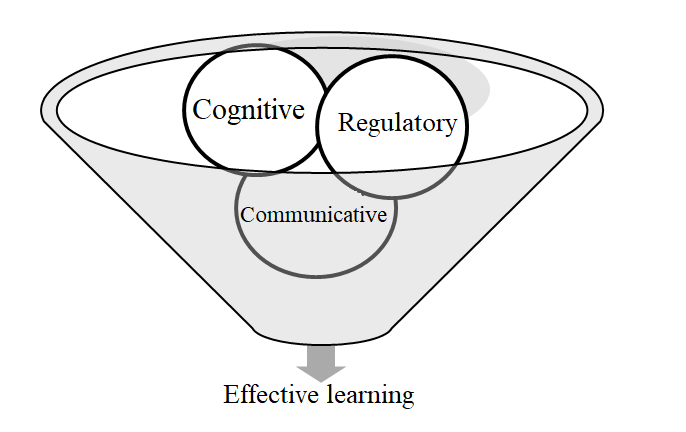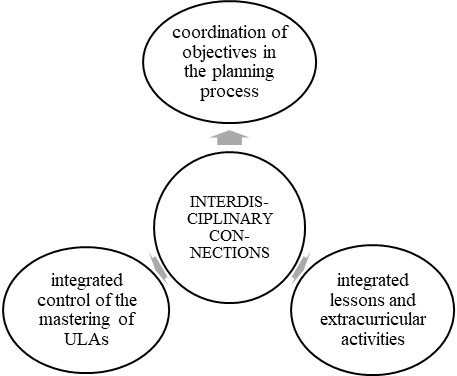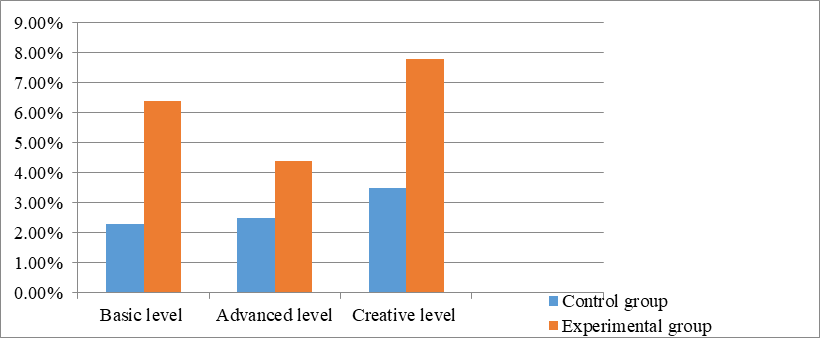Abstract
The article is devoted to the study of metadisciplinary skills of schoolchildren and interdisciplinary connections of the organization of the modern lesson. The authors consider the development of metadisciplinary skills in the modern classroom as interdisciplinary integration. Formation of lesson planning on the basis of the proposed meta-disciplinary technological flowchart of the lesson depends on the chosen form of organization and methods of meta-disciplinarity of academic disciplines. The presented structure of the technological flowchart of the modern lesson allows one to convey to students ways of carrying out learning activities at all stages of learning and their conscious application when dealing with learning and life tasks. In this aspect, meta-disciplinary universal learning activities are considered as elements of student's personality development. The levels and components of meta-skills formation are identified, their main indicators and assessment criteria are outlined. The correlation analysis was carried out, which showed the presence of a close connection in the properly selected lesson structure for the development of meta-disciplinary skills and interdisciplinary integration of academic subjects. Formation of subject-specific and meta-disciplinary skills in the teaching of academic disciplines will allow students to define the meaning of learning and enhance their desire to learn, because volitional processes are organically connected with the activity and are contained in the needs as the initial impulses of a person to take action.
Keywords: Metadisciplinary skills, interdisciplinary connections, modern lesson, universal learning activities
Introduction
Man of modern information society is considered as a creative, resourceful, enterprising, constantly developing person who is in a harmonious relationship with the environment and other people (Khachaturova, 2018). Taking into account the social importance of formation of a creative, functionally literate person, the system of modern school education faces the task of transition to new technologies providing the development of creativity and formation of functional literacy of students (Pevzner et al., 2017). According to scientists, creativity and functional literacy are developed and acquired in the process of solving learning problems of different nature (Helsen et al., 2000; Kharina, 2016). Already in a middle school students should be prepared for professional activity in a competitive environment, in which successful resolution of each situation requires a creative approach, because creative thinking is the engine of science, the key to progress (Khachaturova, 2016).
Problem Statement
The PISA, TIMSS, and PIRLS international comparative quality assessment studies (the most representative surveys of primary and secondary education outcomes) have been assessing the metadisciplinary knowledge and skills of school students since 1995. The results of these studies have shown that Russian schoolchildren do not have significant differences in general educational attainment with their peers in most developed countries of the world (Demidenko & Rustova, 2015). Although Russian schoolchildren have quite extensive subject knowledge and skills, they have difficulties in applying this knowledge in situations close to everyday life, as well as in working with information presented in various forms characteristic of mass media. This is caused by insufficient inclusion of meta-disciplinarity in the content of basic and secondary education (Asmolov, 2018). In this regard, according to the state educational standard of basic general education, the goal of education is to ensure the development of meta-disciplinary skills as a psychological component of the fundamental core of education along with the traditional presentation of the subject content of specific disciplines. In this regard, a research problem has been formulated: identification of ways of forming meta-disciplinary skills and interdisciplinary connections in the organization of a modern lesson.
Research Questions
A number of questions need to be addressed to uncover this problem:
What are the universal learning activities as an element of effective learning?
What is the coordination of objectives by interdisciplinary connections in the lesson planning process?
What is the effectiveness of the meta-subject technology lesson flowchart model for the development of meta-subject skills?
Purpose of the Study
The aim of the research is theoretical and methodological justification of possibilities of modern lesson organization for formation of meta-disciplinary skills and interdisciplinary connections on the basis of meta-disciplinary technological flowchart.
Research Methods
To test the hypothesis and implement the goal, theoretical research methods were used: analysis of philosophical, pedagogical and psychological literature, analysis of syllabuses of academic subjects and methodological manuals for preparation for the state final certification, generalization of pedagogical experience on the problem of research, and empirical methods: survey of teachers, comparative analysis of students' diagnostic works, statistical analysis methods.
Findings
The totality of all universal learning activities (regulatory, cognitive, commutative) in the learning process determines its effectiveness at each stage (Figure 01).

In Table 01, we distinguish the meta-disciplinary orientation of universal learning activities (hereinafter referred to as “ULAs”) (Table 01).
When composing assignments, it is important for the teacher to take into account that in order to achieve the learning objective the students must be personally interested in solving the task, i.e. the task must be interesting for the student, and its wording must be clear and understandable. By highlighting meta-disciplinary universal actions, the teacher guides the search and analysis of necessary information, encourages schoolchildren to master the methods necessary to solve the problem, to achieve the goal set.
From the point of view of pedagogy and psychology these abilities are manifested in regulatory skills and can be mastered by students only on the basis of their own active meta-disciplinary activity (Anisimov, 2017). The activity and independence in meta-disciplinary activity are clearly manifested in the development of projects. Educational projects carried out in the classroom should not be very extensive, but complete in terms of the structure of the activity. Students independently choose the form of presentation of the product, the technology of its creation and the division of responsibilities. Project work cannot be organized spontaneously. Schoolchildren should be led to this level of creative work by each lesson or block of lessons in the academic subjects in a piecemeal manner.
The model of technological flowchart assumes such organization of educational activities that promotes mastering of meta-subject skills in all subjects of the school curriculum, as well as clear coordination of activities of the whole teaching staff and interdisciplinary integration. Integration manifests itself in the establishment of interdisciplinary connections (Figure 02).

Interdisciplinary connections are established on the basis of such important elements as, for example, the development of meta-subject concepts. For effective learning of concepts, teachers of different subjects need to know which meta-disciplinary concepts are taught or have been taught in other subjects. In case the concept has already been covered in other lessons, there is an opportunity to cover it in terms of several subjects.
Mastering of meta-disciplinary skills implies work in each lesson of the subject, and their application, in order to realize the unity of cognitive principles, is organized in the process of conducting integrated lessons using a variety of methods. The subject teacher needs to be clear about which cognitive, regulative and communicative skills students should have at any particular stage of learning. To be able to organize the cognitive activity aimed at the formation of specific skills, to control the level of mastery of skills and carry out corrective work to fill knowledge gaps (Khutorskoy, 2016). It is important to remember that the ability of students to master metasubject skills is determined by the peculiarities of the development of perception, memory and voluntary attention. In order to organize the educational process based on the model of meta-disciplinary flowchart, subject teachers determine special methodological techniques for certain blocks of lesson planning to achieve subject and meta-disciplinary results in the development of work programs. Lesson planning is coordinated by the educational methodological associations of the educational organization (Pevzner et al., 2019). Modern author's programs, on the basis of which subject teachers draw up work programs, contain as an application calendar-thematic planning, which indicates which specific subject and metasubject results should be achieved in a particular lesson. The use of such planning allows the teacher not only to clearly represent the place of each lesson in the general system of the subject, but also to provide interdisciplinary connections.
The study involved 15 teachers of academic subjects (50% of the total number of teachers), 86 students of grades 7-9 (43 students were in the control group and 43 in the experimental group) of the SBEE school №129, St. Petersburg. After a detailed analysis of the work programmes, 28% of meta-disciplinary content tasks were included in the blocks of academic subjects and lesson planning based on the ULAs. Lesson planning is the most pronounced and exclusive part of work in the planning system, since it is a specific lesson that is planned by the teacher taking into account not only the place of the lesson in the general structure of the course, but also taking into account the already achieved and planned level of mastering ULAs by students of a particular class, and even by specific students.
First, when planning a lesson, a teacher should take into account the age-specific psychological features of the nature of students' cognitive activity and the level of development of cognitive abilities (Vansovskaya et al., 1997). Secondly, it is necessary to take into account the achieved level of development of ULAs by students of a particular class, the need to comply with the principles of personality-oriented differentiated learning.
It is expedient to carry out the lesson planning on the basis of meta-subject flowcharts of the lesson. The content of the meta-disciplinary flowchart depends on the form of organization of the lesson and the methods used in the course of the lesson. A model of meta-disciplinary flowchart is presented in Table 02.
The planning of lessons on the model of meta-disciplinary technological flowchart was carried out by teachers of academic subjects, taking into account the choice of forms and methods of organization of learning activities that contribute to the acquisition of subject and meta-disciplinary ULAs during the second quarter, from November to December 2019. The interdisciplinary block tasks were thought out and the goal to be achieved in the process of their implementation was clearly defined. Problematic questions were formulated, which required the selection of the main idea of the text, making a thesis plan, reworking the text into systematizing tables, etc.
In the process of cognitive activity schoolchildren gradually mastered mental skills of different levels of complexity, from understanding and memorizing to performing tasks according to the sample (following instructions), to analysis, synthesis, generalizations and conclusions. This sequence of formation of mental skills was taken into account by teachers in the process of planning and organization of cognitive activity. The formation of cognitive activity skills required the observance of continuity and consideration of age peculiarities (Gormakova, 2018).
With the introduction of the final certification of basic and secondary schools (EGE (RSE) and OGE), testing has become one of the forms of assessment control. Based on the Oxford Capacity Analysis, tasks were selected for diagnostic and test work (Elken et al., 2018; Hills & Argyle, 2016). 82% of the students who participated in the experiment chose the tasks of a practice-oriented nature. The test part of the EGE and OGE control and measurement materials contains practice-oriented tasks, which are based on meta-subject skills and knowledge. In order to practice this type of tasks, teachers included control tasks in blocks containing elements of EGE and OGE control-measuring materials. Educational-methodological kits were revised for the content of assignments differentiated by types of activity and levels of difficulty, which allowed the teacher to put into practice the combined use of all components of educational-methodical kits of educational subjects.
The levels of meta-skills formation (basic, advanced and creative) are presented in Table 03.
The content and statistical data allowed us to trace the correlation of the formation of meta-skills by levels (Saribeyli, 2018). The percentage change at the beginning and the end of the second quarter in the levels of meta-skills formation of control and experimental groups is shown in Figure 03.

The number of schoolchildren's choices of educational projects and research in school and regional scientific conferences has increased (Figure 04).

In addition, a survey of teachers showed that the indicators of the quality of knowledge in all subjects have significantly increased at school (on average - by 13%, according to the results of the second quarter).
Comparative analysis made it possible to theoretically substantiate and experimentally prove the effectiveness of constructing a modern lesson on the basis of a metasubject technological flowchart aimed at developing the metasubject skills of schoolchildren.
Conclusion
The analysis of theoretical sources devoted to the problem of research made it possible to substantiate the importance of approaches that allow us to ensure the acquisition of meta-disciplinary skills by students in the organization of a modern lesson. Such an organization involves: coordination of educational activities of teachers of different subjects; conducting methodological associations based on the results of control of the level of mastering of meta-skills, development of a general plan of corrective work; organizing and conducting integrated lessons-projects, intellectual competitions based on the organization of group work on tasks that require the use of knowledge from different areas.
References
Anisimov, V. V. (2017). Didaktika [Didactics]. Altai state pedagogical University.
Asmolov, A. G. (2018). Kak razrabotat' universal'nyye obrazovatel'nyye deystviya v nachal'noy shkole: ot deystviya k mysli: rukovodstvo dlya uchiteley. [How to design universal educational actions in primary school: from action to thought: a guide for teachers]. Enlightenment.
Demidenko, A. B., & Rustova, N. B. (2015). Problemy obrazovatel'nyh rezul'tatov v mezhdunarodnyh issledovaniyah PISA s 2000 po 2012 god [Educational outcomes issues in the PISA international studies from 2000 to 2012]. Obrazovanie i vospitanie [Education and upbringing], 4(4), 77-80.
Elken, A., Francis, L. J., & Robbins, M. (2018). Internal consistency reliability of the Estonian translation of the Oxford Happiness Measure: Contributingto positive psychology in Estonia. In E. E. Wells (Ed.), Psychological well-being (pp. 223-230). Nova.
Gormakova, V. V. (2018). K voprosu o differenciacii ponyatij “metapredmetnye navyki” i “universal'nye uchebnye dejstviya” [To the differentiation of notions of “meta-disciplinary skills” and “universal learning activities”]. Sibirskij pedagogicheskij zhurnal [Siberian Pedagogical Journal], 6, 18-23.
Helsen, M., Vollebergh, W., & Meeus, W. (2000). Social support from parents and friendsand emotional problems in adolescence. Journal of Youth and Adolescence, 29(3), 319-335.
Hills, P., & Argyle, M. (2016). The Oxford Happiness Questionnaire: a compact scale for the measurement of psychological well-being. Personality and Individual Differences, 33(7), 1073-1082.
Khachaturova, K. R. (2016). The model of the educational process to develop the capacity for creativity in schoolchildren. Components of Scientific and Technological Progress, 3(29), 30-34.
Khachaturova, K. R. (2018). Theoretical grounds of teaching in adolescence. Components of Scientific and Technological Progress, 2(36), 29-31.
Kharina, L. V. (2016). L. S. Vygotskij – osnovopolozhnik otechestvennoj defektologii [L. S. Vygotsky as the founder of national defectology]. Molodoj uchenyj [Young Scholar], 27-1(131), 6-8.
Khutorskoy, A. V. (2016). Metapredmetny urok: Metodicheskoye posobiye. [Metasubject lesson: Methodical manual]. Publishing house “Eidos”; Institute of Human Education Publishing.
Pevzner, M. N., Sheraizina, R. M., Donina, I. A., Petryakov, P. A., & Aleksandrova, N. V. (2017). Marketing-related activity in a heterogeneous educational organization. Revista Espacios, 38(40), 29-43.
Pevzner, M., Shirin, A., Shaydorova, N., & Rakhkochkine, A. (2019). Internationalization of schools in Russia. Policy Futures in Education, 17(6), 715-731.
Saribeyli, F. R. (2018). Theoretical and practical aspects of student self-assessment. Education and science, 20(6), 183-194.
Vansovskaya, L. I., Gaida, V. K., & Gerbachevsky, V. K. (1997). Praktikum po eksperimental'noj i prikladnoj psihologii [Workshop in Experimental and Applied Psychology]. Publishing House of St. Petersburg University.
Copyright information

This work is licensed under a Creative Commons Attribution-NonCommercial-NoDerivatives 4.0 International License.
About this article
Publication Date
15 July 2021
Article Doi
eBook ISBN
978-1-80296-113-3
Publisher
European Publisher
Volume
114
Print ISBN (optional)
-
Edition Number
1st Edition
Pages
1-778
Subjects
Globalization, digital education, leadership, challenges of the time, оn-line pedagogy, universal and national values
Cite this article as:
Aleksandrova, M., Khachaturova, K., & Sherayzina, R. (2021). Metasubject Skills And Interdisciplinary Connections In The Organization Of A Modern Lesson. In A. G. Shirin, M. V. Zvyaglova, O. A. Fikhtner, E. Y. Ignateva, & N. A. Shaydorova (Eds.), Education in a Changing World: Global Challenges and National Priorities, vol 114. European Proceedings of Social and Behavioural Sciences (pp. 752-760). European Publisher. https://doi.org/10.15405/epsbs.2021.07.02.90

